人教版新目标八年级上册 英语语法知识点
人教新目标英语八年级上册Unit1-3重点词组句子及语法
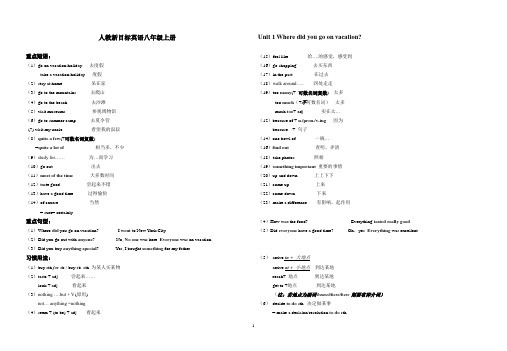
人教新目标英语八年级上册Unit 1 Where did you go on vacation?重点短语:(1)go on vacation/holiday 去度假take a vacation/holiday 度假(2)stay at home 呆在家(3)go to the mountains 去爬山(4)go to the beach去沙滩(5)visit museums 参观博物馆(6)go to summer camp 去夏令营(7) visit my uncle 看望我的叔叔(8)quite a few(+可数名词复数)=quite a lot of 相当多,不少(9)study for……为…而学习(10)go out 出去(11)most of the time 大多数时间(12)taste good 尝起来不错(13)have a good time过得愉快(14)of course 当然= sure= certainly (15)feel like 给….的感觉,感受到(16)go shopping 去买东西(17)in the past 在过去(18)walk around…..四处走走(19)too many(+ 可数名词复数) 太多too much(+不可数名词)太多much too+ adj. 实在太…(12)because of + n./pron./v-ing 因为because + 句子(14)one bowl of 一碗…(16)find out 查明,弄清(18)take photos 照相(19)something important重要的事情(20)up and down 上上下下(21)come up 上来(22)come down 下来(23)make a difference 有影响,起作用重点句型:(1)Where did you go on vacation? I went to New York City.(2)Did you go out with anyone? No, No one was here. Everyone was on vacation. (3)Did you buy anything special? Yes, I bought something for my father. (4)How was the food? Everything tasted really good. (5)Did everyone have a good time? Oh,yes. Everything was excellent.习惯用法:(1)buy sth for sb./ buy sb. sth 为某人买某物(2)taste + adj. 尝起来……look + adj 看起来(3)nothing ….but + V.(原形)not… anything =nothing(4)seem + (to be) + adj 看起来(5)arrive in + 大地点arrive at + 小地点到达某地reach+ 地点到达某地get to +地点到达某地(注:若地点为副词home/there/here则要省掉介词)(6)decide to do sth. 决定做某事= make a decision/resolution to do sth.(7) try doing sth. 尝试做某事try t o do sth. 尽力/努力/设法做某事 try one’s bes t to do sth 尽力做某事 try 过去式:tried, 三单:tries (8)enjoy doing sth . 喜欢做某事 enjoy oneself 玩得开心 (9)want to do sth . 想去做某事 (10)start / begin doing sth. 开始做某事 start / begin to do sth. 开始做某事 (11)stop doing sth. 停止正在做的某事 stop to do sth 停下来做(另一件)某事 (12)dislike doing sth. 不喜欢做某事dislike to do sth . 不喜欢做某事 (13)Why not do sth. 为什么不做…….呢? =Why don’t you do sth.(14)so + adj + that + 从句 如此…以至于 (15)tell sb. (not) to do sth.告诉某人(不要)做某事(16)keep doing sth. 一直做某事Keep on doing sth. 坚持/继续做某事 (17)forget to do sth . 忘记去做某事forget doing sth 忘记做过某事 (remember 记得, 用法一样) 语法点:1.seem 的用法(1)seem + 形容词 看起来….. You seem happy today.(2)seem + to do sth . 似乎、好像做某事 I seem to have a cold No one seemed to be bored.(3)It seems / seemed that+ 句子 看起来好像…;似乎…. It seems that no one believes you. 2. decide to do sth .决定做某事 We decided to go to the beach.. decide + 疑问词 + 动词不定式 He can not decide when to start . 3. over 介词,多于,超过,在…以上(表示数目、程度)= more than My father is over 40 years old. We waited over an hour for the train. 4. because of 因为,由于,后接名词、代词或动名词,不能接句子。
初二上【下】册英语语法知识点总结
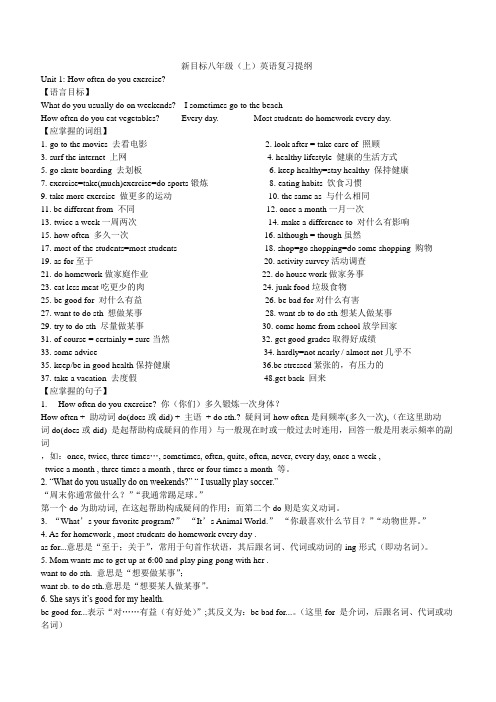
新目标八年级(上)英语复习提纲Unit 1: How often do you exercise?【语言目标】What do you usually do on weekends? I sometimes go to the beachHow often do you eat vegetables? Every day. Most students do homework every day.【应掌握的词组】1.go to the movies 去看电影2. look after = take care of 照顾3.surf the internet 上网4. healthy lifestyle 健康的生活方式5. go skate boarding 去划板6. keep healthy=stay healthy 保持健康7. exercise=take(much)exercise=do sports锻炼8. eating habits 饮食习惯9. take more exercise 做更多的运动10. the same as 与什么相同11. be different from 不同12. once a month一月一次13. twice a week一周两次14. make a difference to 对什么有影响15. how often 多久一次16. although = though虽然17. most of the students=most students 18. shop=go shopping=do some shopping 购物19. as for至于20. activity survey活动调查21. do homework做家庭作业22. do house work做家务事23. eat less meat吃更少的肉24. junk food垃圾食物25. be good for 对什么有益26. be bad for对什么有害27. want to do sth 想做某事28. want sb to do sth想某人做某事29. try to do sth 尽量做某事30. come home from school放学回家31. of course = certainly = sure当然32. get good grades取得好成绩33. some advice 34. hardly=not nearly / almost not几乎不35. keep/be in good health保持健康36.be stressed紧张的,有压力的37. take a vacation 去度假48.get back 回来【应掌握的句子】1. How often do you exercise? 你(你们)多久锻炼一次身体?How often + 助动词do(does或did) + 主语+ do sth.? 疑问词how often是问频率(多久一次),(在这里助动词do(does或did) 是起帮助构成疑问的作用)与一般现在时或一般过去时连用,回答一般是用表示频率的副词,如:once, twice, three times…, sometimes, often, quite, often, never, every day, once a week ,twice a month , three times a month , three or four times a month 等。
八年级英语上册Unit4短语语法知识点汇总(人教新目标版)

Unit 4 What's the best movie theater一、必背短语。
【教材内容解析】Section Afortable seat. (P. 25)seat作名词,表示“座位”,常用短语为book a seat“预定座位”;take/have a seat“坐下”。
There are enough seats in the meeting room.Take/have a seat.2.close to home (P. 25)close此处用作形容词,表示“离……近”,常用的句型为be close to“靠近”,反义词是far。
The cinema is close to my home.3.You can buy clothes the most cheaply there. (P. 26)cheaply这里是副词,表示“便宜地、低廉地”。
His parents live as cheaply as possible.4.The DJs choose songs the most carefully. (P. 26)choose用作及物动词,表示“选择”,后接名词或者不定式作宾语,名词形式为choice。
They are choosing food for the party tonight.He chose to sing an English song.5.Can I ask you some questions? (P. 26)some意为“一些”,常用语肯定句中,用于疑问句中,表示提出建议、请求并期待给予肯定回答。
---Can I have some bread?---Of course. Here you are.6.How do you like it so far? (P. 26)so far意为“到目前为止、迄今为止”。
Have you got any information about him so far?7.Thanks for telling me. (P. 26)thanks for意为“因……而感谢”,后接名词或者动名词,相当于thank you for...。
新人教新目标版八年级英语上册短语语法知识点汇总

人教版八年级英语上册短语语法知识点总结初二英语课组2019年[由我校初二英语科组根据最新考纲和近几年中考的趋势加上我校学生的实际情况,结合初二全体英语科组的力量,汇编了这一份重点总结,编好一份学案不易,望同学们能好好利用。
]Unit 1 Where did you go on vacation一、必背单词短语。
Section A1.Where did you go on vacation? (P. 1)on vacation意为“在度假”,结构“on+名词”表示“在某种状态中”。
例句:My family went to Hainan on vacation last year.2....visited my uncle (P. 1)visit此处用作及物动词,后接人或物做宾语,意为“拜访、看望”,后接表示地点的名词,意为“参观、游览”。
例句:I visited my grandmother last week.例句:Do you want to visit Shanghai?3....go with anyone? (P. 2)(1)anyone用作不定代词,意为“有人、任何人”,相当于anybody,用于疑问句和否定句中,在肯定句中用someone或者somebody。
但是anyone也可以用在肯定句中,表示“任何一个人”。
例句:Did you meet anyone friendly in that city?例句:Anyone can be helpful in some way.(2)anyone只能指人,不可以指物,后面不接of短语;any one既可以指人也可以指物,后可接of短语。
例句:You can ask any one of us about this question.4....buy anything special? (P. 2)(1)buy用作双宾语动词,表示“买”,常用的结构为“buy sb. sth.”或者“buy sth. for sb.”,表示“为某人买某物”。
人教版八年级英语上册语法总结

人教版八年级英语上册语法总结一、一般现在时。
1. 概念。
- 表示经常或习惯性的动作或状态;表示客观事实或普遍真理。
- 例如:I often get up at six o'clock.(经常的动作)- The earth goes around the sun.(客观真理)2. 动词形式。
- 当主语是第三人称单数(he/she/it等)时,动词要加 -s或 -es。
- 一般情况加 -s,如:like - likes;以s, x, ch, sh, o结尾的动词加 -es,如:go - goes, watch - watches;以辅音字母 + y结尾的动词,把y变为i再加 -es,如:study - studies。
- 当主语不是第三人称单数时,动词用原形。
例如:They play football every day.3. 句型结构。
- 肯定句:主语+动词(原形/第三人称单数形式)+其他。
- 否定句:主语+don't/doesn't+动词原形+其他。
(do not = don't,does not = doesn't)- 一般疑问句:Do/Does+主语+动词原形+其他?回答:Yes, 主语+do/does. No, 主语+don't/doesn't.二、一般过去时。
1. 概念。
- 表示过去某个时间发生的动作或存在的状态。
- 例如:I went to the park yesterday.2. 动词形式。
- 一般动词在词尾加 -ed,如:play - played;以不发音的e结尾的动词加 -d,如:live - lived;以重读闭音节结尾且末尾只有一个辅音字母的动词,双写这个辅音字母再加 -ed,如:stop - stopped;以“辅音字母 + y”结尾的动词,把y变为i再加 -ed,如:study - studied。
还有一些不规则动词,如:go - went, see - saw等。
八年级英语上册Unit7短语语法知识点汇总(人教新目标版)
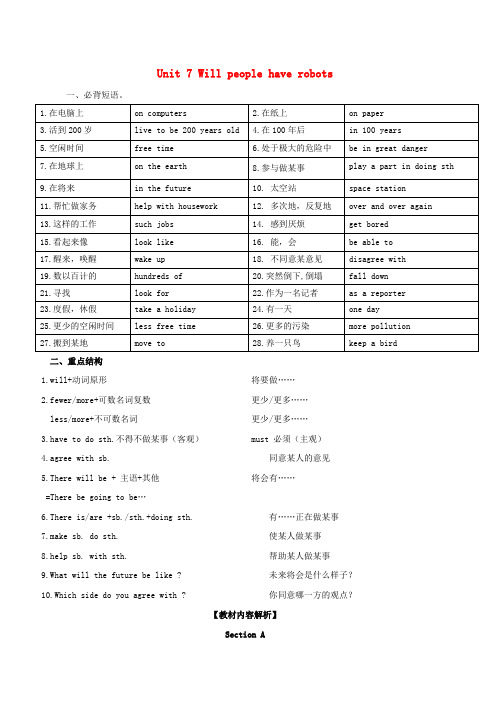
Unit 7 Will people have robots一、必背短语。
二、重点结构1.will+动词原形将要做……2.fewer/more+可数名词复数更少/更多……less/more+不可数名词更少/更多……3.have to do sth.不得不做某事(客观)must 必须(主观)4.agree with sb. 同意某人的意见5.There will be + 主语+其他将会有……=There be going to be…6.There is/are +sb./sth.+doing sth. 有……正在做某事7.make sb. do sth. 使某人做某事8.help sb. with sth. 帮助某人做某事9.What will the future be like ? 未来将会是什么样子?10.Which side do you agree with ? 你同意哪一方的观点?【教材内容解析】Section A1.Do you think there will be robots in people’s homes? (P. 49)本句是主从复合句,从句为宾语从句,如果do you think放在句中,则为插入语,放在特殊疑问词后面,结构为:疑问词+do you think+主语+谓语+其它。
例句:Which do you think is the best movie theatre?2.People will l ive to be 200 years old. (P. 49)live to be+基数词+years old意为“活到……岁”。
例句:In the story, people will live to be 500 years old.3.Will people use money in 100 years? (P. 49)“in+一段时间”表示“在……之后”或“在……之内”,通常用于一般将来时,常用来回答how soon的提问;“for+一段时间”则表示持续多长时间,用来回答how long的提问。
新目标八年级英语上册unit2语法总结

新目标八年级英语上册unit2语法总结新目标八年级英语上册unit2语法总结Unit2What’sthematter?1.kindof=abit=alittle一点儿(表示程度) e.gI’mkindof/abit/alittleunhealthy.我有点儿不安康。
2.alittle+n.=abitof+n3.should,can,will,would,may,need,must这些情态动词不能加S,没有第三人称单数形式。
4.starttodosth=startdoingsth开头做某事5.wish/hopetodosth Wishsbtodosth(此处wish不能改为hope,没有hopesbtodosth的用法)6.Ihopeso我盼望如此。
否认形式:Ihopenot.我不盼望如此。
7.Ithinkso.否认:Idon’tthinkso.3aAhealthylifestyle,theChineseway8.insomeways在某些方面9.onone’swayto+n在某人去的道路上(onmywaytoschool在我去学校的路上onmywaytosuccess在我通往胜利的道路上)10.inthisway用这种方法e.gInthisway,youcangetgoodgrades.11.abalanceofAandBA和B的平衡12.forexample举个例子13.needtodosth需要做某事e.gIneedtocutmyhair.我需要理发。
Needdoingsth=needtobedone需要被做某事e.gMyhairneedcutting.=Myhairneedtobecut.我的头发需要被剪。
14.sthbepopularwithsbe.gChinesemedicineisnowpopularwithpeopleinwesterncountries.15.I t’s+adj.(形容词)+todosth做某事怎么样e.gIt’seasytohaveahealthylifestyle.It’simportanttohavegoodhabits.16.believe认为e.gIbelieveit’simportanttosleepeighthoursanight.我认为每晚睡八小时很重要。
八年级英语上册Unit3短语语法知识点汇总(人教新目标版)
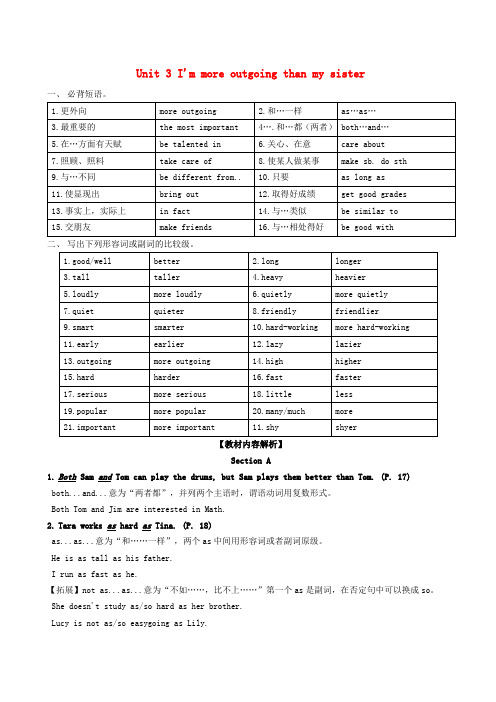
Unit 3 I'm more outgoing than my sister一、必背短语。
二、写出下列形容词或副词的比较级。
【教材内容解析】Section A1.Both Sam and Tom can play the drums, but Sam plays them better than Tom. (P. 17) both...and...意为“两者都”,并列两个主语时,谓语动词用复数形式。
Both Tom and Jim are interested in Math.2.Tara works as hard as Tina. (P. 18)as...as...意为“和……一样”,两个as中间用形容词或者副词原级。
He is as tall as his father.I run as fast as he.【拓展】not as...as...意为“不如……,比不上……”第一个as是副词,在否定句中可以换成so。
She doesn't study as/so hard as her brother.Lucy is not as/so easygoing as Lily.3.Oh, which one was Lisa?(P. 18)which表示“哪一个”,表示在一定数量中进行选择;what用于选择范围较大或者不明确时,表示选择人或物的种类。
There are some books in the box. Which one is yours?What is in the box?4.You can tell that Lisa really wanted to win, though.(P. 18)(1) win表示“赢得”后接比赛、奖项等表示物的名词作宾语;beat表示“打败”,后接某人、团队等表示人的名词作宾语。
They finally beat the other side and won the basketball match.Who won the first prize in the singing contest.(2)这里的though作副词,表示“可是、然而”,放在句末,前用都好隔开。
人教版新目标八年级英语上册Unit 7讲义及重点总结

新目标八年级上册Unit 7 Will people have robots? 讲义一、词性转换1.paper n. 纸张(不可数)2.pollution n. 污染物pollute v. 污染3.prediction n. 预言;预测predict v. 预测4.astronaut n. 宇航员5.dangerous a. 有危险的danger n. 危险6.disagree v. 不同意7.possible a. 可能的impossible a. 不可能的8.probably adv. 很可能二、短语归纳1.play a part 参加(某事)2.space station 太空站3.over and over again 多次;反复地4.hundred of 许多;大量5.fall down 突然倒下;跌倒6.look for 寻找;寻求7.in great danger 在巨大的危险中8.help with 帮助9.for example 举例10.in the future 在未来11.look like 看起来像12.wake up 醒来13.fewer people更少的人14.14. less free time更少的空闲时间15.15. in ten years 10年后(提问用How soon)16.fall in love with…爱上…17.hundreds of +名词复数数百/几百(概数,类似还有thousands of; millions of)18.the same as 和……相同19.A be different from B A与B不同20.wake up醒来21.get bored变得厌倦(get/become+形容词)22.keep a bird 养一只鸟23.lots of /a lot of许多+可数或不可数名词24.disagree with sb.不同意某人(的意见)disagree on sth. 不同意某事25.I don’t agree. = I disagree.我不同意26.on vacation度假27.help sb with sth 帮助某人做某事28.live in an apartment住在公寓里live on the earth 住在地球上29.besides与except =but(除…之外,不包括)30.be able to与can 能、会31.live on a space station 住在空间站32.over and over again 一次又一次33.10 years from now 今后10年34.be difficult to do 做……有困难35.the same …as 和……一样三、重难点深度解析1. Do you think there will be robots in people's homes? 你认为将来人们的家里会有机器人吗?Do you think...? 结构通常用来征求对方的意见或看法,后面接宾语从句,从句用陈述语序。
人教新目标八年级英语上册1-4单元语法点总结
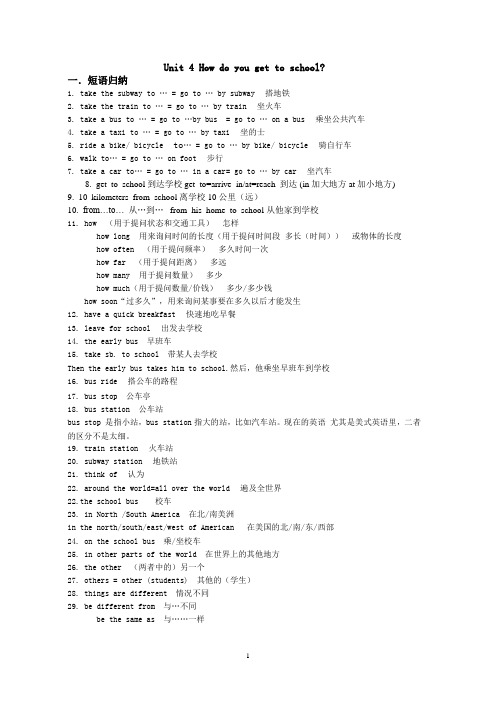
Unit 4 How do you get to school?一.短语归纳1. take the subway to …= go to … by subway搭地铁2. take the train to …= go to … by train坐火车3. take a bus to …= go to …by bus= go to … on a bus乘坐公共汽车4. take a taxi to …= go to … by taxi坐的士5. ride a bike/ bicycle to…= go to … by bike/ bicycle骑自行车6. walk to…= go to … on foot步行7. take a car to…= go to … in a car= go to … by car坐汽车8. get to school到达学校get to=arrive in/at=reach 到达 (in加大地方at加小地方)9. 10 kilometers from school离学校10公里(远)10. from…to…从…到…from his home to school 从他家到学校11. how(用于提问状态和交通工具)怎样how long用来询问时间的长度(用于提问时间段多长(时间))或物体的长度how often(用于提问频率)多久时间一次how far(用于提问距离)多远how many用于提问数量)多少how much(用于提问数量/价钱)多少/多少钱how soon“过多久”,用来询问某事要在多久以后才能发生12. have a quick breakfast快速地吃早餐13. leave for school出发去学校14. the early bus 早班车15. take sb. to school 带某人去学校Then the early bus takes him to school.然后,他乘坐早班车到学校16. bus ride搭公车的路程17. bus stop 公车亭18. bus station 公车站bus stop 是指小站,bus station指大的站,比如汽车站。
人教版新目标八年级英语上册各单元知识详解
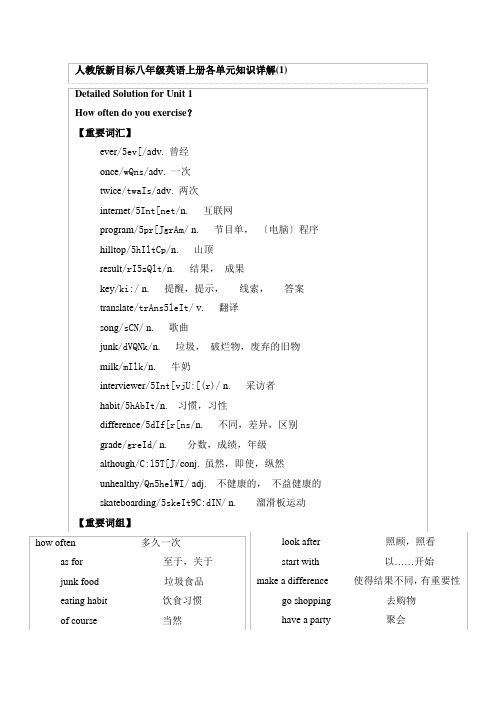
Detailed Solution for Unit 2 What’s the matter.【重要词汇】◆ matter/5mAt[/n.事情,问题,过失◆ arm/B:m/n.臂,胳膊◆ back/bAk/n.后背,背脊◆ ear/I[/n.耳朵◆ eye/aI/n.眼睛◆ foot/fJt/n.脚,足〔pl. feet/fi:t/〕◆ leg/leg/n.腿,腿部◆ neck/nek/n.脖子,颈部◆ nose/n[Jz/n.鼻子◆ stomach/5stQm[k/n.胃,胃部◆ tooth/tU:W/n.牙齿(pl. teeth/ti:W/)◆ sore/sC:,sC[/adj.疼痛的◆ stomachache/5stQm[keIk/n.胃痛,腹痛,肚子痛◆ throat/Wr[Jt/n.喉头,喉咙◆ toothache/5tU:WeIk/n.牙痛◆ fever/5fi:v[/n.发烧◆ lie/laI/v.躺,卧,平放在某处(lay, lain)◆ honey/5hQnI/n.蜂蜜◆ dentist/5dentIst/n.牙医◆ illness/5IlnIs/n.疾病,生病◆ advice/[d5vaIs/n.劝告,忠告,建议◆ thirsty/5W\:stI/adj.渴的,口渴的◆ heal/hi:l/v. 医治,治愈◆ balance/5bAl[ns/n. 平衡,平衡状态,协调◆ beef/bi:f/n. 牛肉◆ lamb/lAm/n. 小羊,羊羔,羊羔肉◆ energy/5en[dVI/n.精力,活力,能力◆ life/laIf/n. 生命,人生◆ bean/bi:n/n.豆,豆科植物◆ stray/streI/v. 远离,走失,离题◆ balanced/5bAl[nst/adj.平衡的,协调的◆ diet/5daI[t/n. 饮食,节食◆ backache/5bAkeIk/n.背痛◆ improve/Im5prU:v/v. 改善,改进,提高◆ speaking/5spi:kIN/ n. 口语◆ headache/5hedeIk/ n. 头痛◆ homestay/5h[JmsteI/ n. 待在家里◆ important//Im5pC:t[nt/adj. 重要的,重大的,严重的【重要词组】◆ have a cold患感冒◆ stressed out 紧张的,有压力的◆ bean sprout豆芽◆ get tired感觉疲惫◆ stay healthy保持健康◆ at the moment此刻,现在◆ get/ have a cold患感冒◆ see a doctor /dentist看医生/牙医◆ go to the party去参加聚会◆ make sb sick使某人不舒服(患锁病)◆ have a sore throat嗓子痛◆ have a fever发烧,发热◆ have a toothache牙痛◆ have a backache背痛◆ lie down and rest 躺下休息◆ drink lots of water 喝大量水◆ drink hot tea with honey 喝热蜂蜜茶◆ have a headache头痛◆ get tired 累了【重要词汇扩展】身体部位:head头neck颈部shoulder肩back后背leg腿thigh大腿arm手臂hand手nose 鼻子eye眼睛ear耳朵mouth嘴tooth牙齿foot脚〔注意foot的复数形式为feet,tooth的复数形式为teeth〕stomach胃throat喉咙,咽喉chest胸部pit胸口abdomen lung肺heart心脏liver 肝脏腹部waist腰backbone脊骨,脊柱hip臂部joint关节muscle肌肉nerve神经brain 脑疾病:cancer癌 influenza , flu流感 cough咳嗽sore eyes眼睛疼stuffy nose鼻子不通气 insomnia失眠医院工作人员:doctor in charge主治医生 head nurse护士长internist , physician内科医生surgeon外科医生dentist牙科医生 ear-nose-throat doctor 耳鼻喉医生医院名称:children’s hospital儿童医院 clinic 诊疗所first - aid station 急救站 ward 病房medical department 内科 surgical department 外科registration office 挂号处 out - patient department(OPD) 门诊部in - patient department 住院部 nursing department 护理部waiting room 候诊室 emergency room 急诊室operation room 手术室 laboratory 化验室blood bank 血库 pharmacy , dispensary 药房表示感觉的形容词有:tired 累的 thirsty口渴的 hungry饿的 stressed out紧张的,有压力的【重要词句详解】1. How to talk about our health①问某人哪儿不舒服:When we are not feeling well , we often go to see the doctor . The doctor will ask : What’s wrong (with you) ?What’s the matter (with you) ?What’s your trouble ?What happens to you ?Is there anything wrong with you ?都表示“你怎么了?”。
新目标人教版初中八年级上册英语语法汇总

新目标人教版初中八年级上册英语语法汇总1) leave的用法1.“leave+地点”表示“离开某地”。
例如When did you leave Shanghai?你什么时候离开上海的2.“leave for+地点”表示“动身去某地”。
例如Next Friday, Alice is leaving for London. 下周五爱丽斯要去伦敦了。
3.“leave+地点+for+地点”表示“离开某地去某地”。
例如Why are you leaving Shanghai for Beijing?你为什么要离开上海去北京2) 情态动词should“应该”学会使用should作为情态动词用常常表示意外、惊奇、不能理解等有“竟会”的意思例如How should I know? 我怎么知道Why should you be so late today?你今天为什么来得这么晚should有时表示应当做或发生的事例如We should help each other.我们应当互相帮助。
我们在使用时要注意以下几点1. 用于表示“应该”或“不应该”的概念。
此时常指长辈教导或责备晚辈。
例如You should be here with clean hands. 你应该把手洗干净了再来。
2. 用于提出意见劝导别人。
例如You should go to the doctor if you feel ill. 如果你感觉不舒服你最好去看医生。
3. 用于表示可能性。
should的这一用法是考试中常常出现的考点之一。
例如We should arrive by supper time. 我们在晚饭前就能到了。
She should be here any moment. 她随时都可能来。
3) What...? 与Which...?1. what 与which 都是疑问代词都可以指人或事物但是what仅用来询问职业。
如Whatis your father? 你父亲是干什么的该句相当于What does your father do?What is your father's job?Which 指代的是特定范围内的某一个人。
人教新目标英语八年级上册 Unit 1 sectionA语法知识点总结

人教新目标英语八年级上册Unit 1 sectionA语法知识点总结Unit 1 Where did you go on vacation?一般过去时态的概念:1.表示过去某时间发生的动作或存在的状态。
2.表示过去经常性习惯性的动作。
一般过去时常用的标志词有:yesterday,the day before yesterday,last week/month/year, just now, …ago,in+过去时间…一.用Be动词的一般过去时(1)肯定句式:主语+ was / were + 其它.(2)否定句式:主语+ wasn’t /weren’t+ 其它.(3)一般疑问句:Was/Were + 主语+ 其它?肯定回答:Yes,主语+ was / were .否定回答:No,主语+ wasn’t /weren’t.(4)特殊疑问词+was/were+主语+其他?肯定句:The air was clean yesterday.否定句:The air wasn't clean yesterday.一般疑问句:Was the air clean yesterday?肯定回答:Yes, it was.否定回答:No, it wasn't.特殊疑问句:How was the air yesterday?二.行为动词(v.)的一般过去时态(1)肯定句式:主语+ v-ed+ 其它.【do , does---did】(2)否定句式:主语+ didn’t + v原形+ 其它. 【did not = didn’t】(3)一般疑问句:Did + 主语+ v原形+ 其它?肯定回答:Yes,主语+did.否定回答:No,主语+did’t.(4)特殊疑问词+did+主语+v.原形+其他?肯定句:I rode a horse last Sunday.否定句:I didn‘t ride a horse last Sunday.一般疑问句:Did you ride a horse last Sunday? 肯定回答:Yes, I did.否定回答:No, I didn't.特殊疑问句:(1)What did you do last Sunday?(2)When did you ride a horse?三、动词过去式的构成1. 规则动词的过去式1) 一般情况下,在动词原形后面加-ed。
人教新目标英语八年级上册unit1-Unit4单元重点知识复习
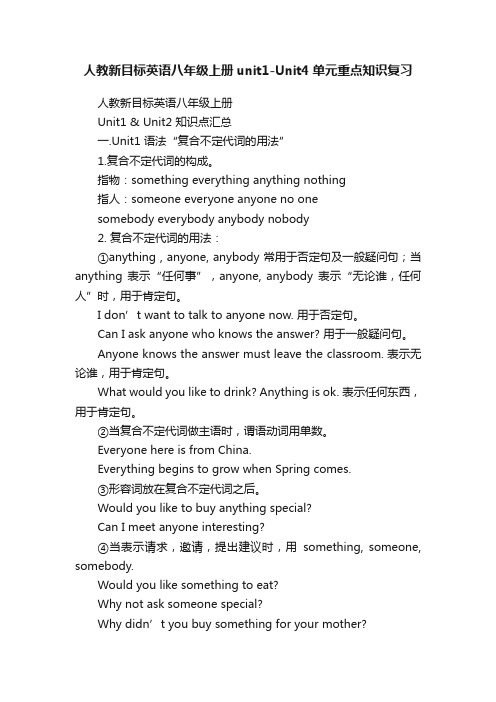
人教新目标英语八年级上册unit1-Unit4单元重点知识复习人教新目标英语八年级上册Unit1 & Unit2 知识点汇总一.Unit1 语法“复合不定代词的用法”1.复合不定代词的构成。
指物:something everything anything nothing指人:someone everyone anyone no onesomebody everybody anybody nobody2. 复合不定代词的用法:①anything , anyone, anybody 常用于否定句及一般疑问句;当anything 表示“任何事”,anyone, anybody 表示“无论谁,任何人”时,用于肯定句。
I don’t want to talk to anyone now. 用于否定句。
Can I ask anyone who knows the answer? 用于一般疑问句。
Anyone knows the answer must leave the classroom. 表示无论谁,用于肯定句。
What would you like to drink? Anything is ok. 表示任何东西,用于肯定句。
②当复合不定代词做主语时,谓语动词用单数。
Everyone here is from China.Everything begins to grow when Spring comes.③形容词放在复合不定代词之后。
Would you like to buy anything special?Can I meet anyone interesting?④当表示请求,邀请,提出建议时,用something, someone, somebody.Would you like something to eat?Why not ask someone special?Why didn’t you buy something for your mother?Unit2 语法“频率副词”How often 常用于对频率的提问,意为“多长时间一次”,其答语可以是once/ twice / three times a week; always/ usually/ often/ sometimes/ hardly ever/ never 等表示时间频率的副词及短语。
人教版新目标七八年级英语重点常见语法单词
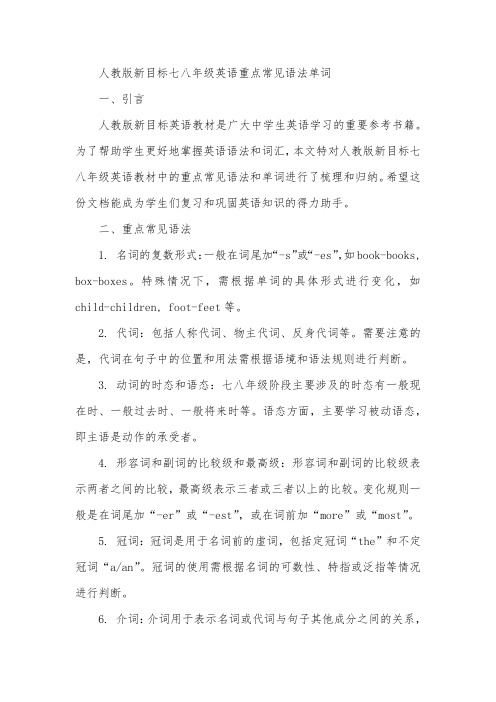
人教版新目标七八年级英语重点常见语法单词一、引言人教版新目标英语教材是广大中学生英语学习的重要参考书籍。
为了帮助学生更好地掌握英语语法和词汇,本文特对人教版新目标七八年级英语教材中的重点常见语法和单词进行了梳理和归纳。
希望这份文档能成为学生们复习和巩固英语知识的得力助手。
二、重点常见语法1. 名词的复数形式:一般在词尾加“-s”或“-es”,如book-books, box-boxes。
特殊情况下,需根据单词的具体形式进行变化,如child-children, foot-feet等。
2. 代词:包括人称代词、物主代词、反身代词等。
需要注意的是,代词在句子中的位置和用法需根据语境和语法规则进行判断。
3. 动词的时态和语态:七八年级阶段主要涉及的时态有一般现在时、一般过去时、一般将来时等。
语态方面,主要学习被动语态,即主语是动作的承受者。
4. 形容词和副词的比较级和最高级:形容词和副词的比较级表示两者之间的比较,最高级表示三者或三者以上的比较。
变化规则一般是在词尾加“-er”或“-est”,或在词前加“more”或“most”。
5. 冠词:冠词是用于名词前的虚词,包括定冠词“the”和不定冠词“a/an”。
冠词的使用需根据名词的可数性、特指或泛指等情况进行判断。
6. 介词:介词用于表示名词或代词与句子其他成分之间的关系,如时间、地点、方式等。
常见的介词有in, on, at, for, with等。
7. 句子成分和句子类型:了解句子的基本成分(主语、谓语、宾语等)以及各种句子类型(陈述句、疑问句、祈使句、感叹句)的特点和使用方法。
三、重点常见单词1. 学习用品类:book, pen, pencil, ruler, eraser, backpack 等。
2. 家庭成员类:father, mother, brother, sister, grandfather, grandmother等。
3. 数字类:one, two, three, four, five, six等。
初中英语人教新目标八年级上册Unit1-4知识要点归纳

八年级英语上册Unit1-4知识要点归纳Unit1【重点短语】1.go on vacation 去度假= take/have a vacation2.go to the mountains/the beach/summer camp去山区/海滩/夏令营3.bring back...from... 从……带回……4.quite a few/ a little/a lot (of) 相当多;不少5.study for... 为……而学习6.have a good time 玩得高兴;过得愉快= have fun/ enjoy oneself7.keep a diary 记日记8.in the past 在过去9.walk around 四处走走10.too many/much 太多11.because of 因为12.one bowl of... 一碗……13.the next day 第二天14.find out 找出;查明15.take photos 照相16.something important 重要的事17.up and down 上上下下e up 升起19.in excitement 兴奋地;激动地【重点语法】一、复合不定代词1.构成:由some,any, every,no加上one,body, thing构成的不定代词称为复合不定代词。
具体见下表:2.用法(1)复合不定代词相当于名词,在句中可以作主语、宾语和表语,但不能作定语。
There is someone outside the door.(主语)门外有人。
I don't have anything to say today(宾语)我今天没什么可说的。
Money isn't everything.(表语)金钱不是一切。
(2)复合不定代词被形容词、动词不定式等修饰时,形容词和动词不定式等应置于其后。
I have something important to tell you.不定代词形容词我有重要的事情要告诉你。
人教版新目标八年级上册英语知识点全册

Unit1 Where did you go on vacation?重点短语1. go on vacation去度假2.stay at home 待在家里3.go to the mountains 去爬山4. go to the beach 去海滩5. visit museums 参观博物馆6. go to summer camp 去参加夏令营7.quite a few 相当多8.study for 为……而学习9.go out 出去10.most of the time 大部分时间11. taste good 尝起来很好吃12.have a good time 玩得高兴13. of course 当然14.feel like 给……的感觉;感受到15.go shopping 去购物16.in the past 在过去17. walk around 四处走走18. because of 因为19. one bowl of… 一碗……20. the next day 第二天21. drink tea 喝茶22. find out 找出;查明23. go on 继续24.take photos 照相25. something important 重要的事26. up and down 上上下下27. come up 出来28. buy sth. for sb. / buy sb. sth. 为某人买某物29. taste + adj. 尝起来……30. look+adj. 看起来……31.nothing…but+动词原形除了……之外什么都没有32.seem+(to be)+ adj. 看起来……33. arrive in+大地点/ arrive at+小地点到达某地34.decide to do sth. 决定去做某事35. try doing sth. 尝试做某事/36. try to do sth. 尽力去做某事37. forget doing sth. 忘记做过某事/38. forget to do sth. 忘记做某事39. enjoy doing sth. 喜欢做某事40. want to do sth. 想去做某事41. start doing sth. 开始做某事42. stop doing sth. 停止做某事43. dislike doing sth.不喜欢做某事44. keep doing sth. 继续做某事45. Why not do. sth.? 为什么不做……呢?46. so+adj.+that+从句如此……以至于……47. tell sb. (not) to do sth. 告诉某人(不要)做某事48 .have a good time=enjoy oneself=have fun(doing sth.)玩得痛快三、重点句子:1. Where did you go on vacation? 你去哪儿度假的?2. Long time no see. 好久不见。
- 1、下载文档前请自行甄别文档内容的完整性,平台不提供额外的编辑、内容补充、找答案等附加服务。
- 2、"仅部分预览"的文档,不可在线预览部分如存在完整性等问题,可反馈申请退款(可完整预览的文档不适用该条件!)。
- 3、如文档侵犯您的权益,请联系客服反馈,我们会尽快为您处理(人工客服工作时间:9:00-18:30)。
人教版新目标八年级上册英语语法知识点(一)一般将来时一般将来时表示将来某个时间要发生的动作或者存在的状态。
通常与表示将来的时间状语连用,如tomorrow, the day after tomorrow, next year, next month, next week, in 100 years等。
be going to do (动词原形)结构:表示打算、准备做的事情或者肯定要发生的事情。
如:It is going to rain.will do 结构表示将来的用法:1. 表示预见Do you think it will rain?You will feel better after a good rest.2. 表示意图I will borrow a book from our school library tomorrow.What will she do tomorrow?基本构成如下:一般疑问句构成:(1)will+主语+do…? Will Sarah come to visit me next Sunday?(2)there be 结构的一般疑问句:Will there + be …?Will there be fewer trees? Yes, there will. / No, there won’t否定句构成:will + not (won’t)+doSarah won’t come to visit me next Sunday.特殊疑问句构成:特殊疑问词+will+主语+…?What will Sarah do next Sunday?★★练一练★★根据例句,用will改写下列各句例:I don’t feel well today. (be better tomorrow)I’ll be better tomorrow.1. Gina has six classes today. (have a lot of homework tonight)_____________________________2. I’m tired now. (sleep later)_____________________________3. My parents need a new car. (buy one soon)_____________________________4. We can’t leave right now. (leave a little later)_____________________________5. The weather is awful today. (be better tomorrow)_____________________________答案:1. She’ll have a lot of homewo rk tonight.2. I’ll sleep later.3. They’ll buy one soon.4. We’ll leave a little later.5. Maybe it’ll be better tomorrow.(二)should的用法:should用来提出建议和忠告,后边加动词原形,否定句直接在should后边加not.例如:I think you should eat less junk food.我认为你应该少吃垃圾食品。
She drives a lot and she seldom walks. So I think she should walk a lot.她经常开车,很少走路。
所以我认为她应该多走路。
Students shouldn’t spend too much time playing computer games.学生们不应当花太多的时间玩计算机游戏。
学习向别人提建议的几种句式:(1)I think you should…(2)Well, you could…(3)Maybe yo u should …(4)Why don’t you…?(5)What about doing sth.?(6)You’d better do sth.★★练一练★★用should或shouldn’t填空1. I can’t sleep the night before exams.You ______ take a warm shower before you go to bed.2. Good friends ______ argue each other.3. There is little milk in the glass. We _______ buy some.4. They didn’t invite you? Maybe you ______ be friendlier.5. I am a little bit overweight. So I think I _______ do exercises every day.答案:1. should 2. shouldn’t 3. should 4.should 5. should(三)过去进行时过去进行时表示过去某一点时间正在进行的动作或者过去某一段时间内一直进行的动作。
1. 构成was /were + doing,例如:I was watching TV at 9 o’clock last night.at 9 o’clock last night是时间点They were playing football all afternoon.all afternoon是时间段2. 过去进行时的标志词at 8 o’c lock last night, this time yesterday等。
例如:I was having lunch at home this time yesterday.昨天的这个时候我正在吃午饭。
At that time she was writing a book.那阵子她在写一本书。
(表示她在那段时间里一直在做那件事情。
)★★练一练★★用括号中所给动词的适当形式填空。
1. This time yesterday I ____ ______(read)books.2. At 9 o’clock last Sunday they ______ ______(have)a party.3. When I _____(come)into the classroom, she ________ ______(read)a storybook.4. She _____ ______(play)computer games while her mother __________(cook)yesterday afternoon.5. I _____ ______(have)a shower when you _______(call)me yesterday.答案:1. was reading 2. were having 3. came; was reading4. was playing; was cooking5. was having; called(四)间接引语形成步骤:(1)不要逗号,冒号,引号(2)要考虑到人称的变化(人称的变化与汉语是一致的)(3)要考虑时态的变化(4)要考虑时间状语、地点状语和语示代词的变化。
1. 直接引语变成间接引语时,几个主要时态的变化规律2. 直接引语变成间接引语时,一些词汇的变化规律★★练一练★★用括号中所给动词的适当形式填空。
1. She said I _____(be)hard-working.2. Peter told me he _____(be)bored yesterday.3. She said she _____(go)swimming last Sunday.4. Bobby said he _____(may)call me later.5. Antonio told me he _____(read)a book then.答案:1. was 2. was 3. went 4. might 5. was reading请转述他人说的话:1. I go to the beach every Saturday. (Tom)2. I can speak three languages. (Lucy)3. I will call you tomorrow. (Mike)4. I’m having a surprise party for Lana. (she)(五)if引导的条件状语从句结构:if+一般现在时,主语+将来时含义:如果……,将要……例如:If you ask him, he will help you.如果你请求他,他会帮助你。
If need be, we’ll work all night.如果需要,我们就干个通宵。
★★练一练★★根据中文提示,完成句子。
1. 如果你参加聚会,你将会过得很开心。
If you ________ the party, you __________.2. 如果明天下雨,我们将不去野餐。
If it __________ tomorrow, we ___________.3. 如果你经常听英文歌,你将会喜欢英语的。
If you often ________, you _________________.答案:1. If you go to the party, you will have a good time2. If it rains tomorrow, we won’t go to the picnic3. If you often listen to English songs, you’ll like English二. 完形填空特点及解题思路(一)题型分类与特点完形填空试题是在给出的一篇短文中有目的地拿掉若干个词,留下一些空格,要求考生借助短文保留的部分,从所给的短文整体出发,在正确理解短文意思的基础上,根据句子和句子间的内在联系、词的用法和习惯搭配等,用适当的词或词语填空,使补全后的短文意思通顺、前后连贯、结构完整。
这种题型测试的内容从形式上看是单词或短语的填空,但它必须注意到短文中上、下文意思连贯、词语搭配和语法结构正确,所以在空格上所填的词必须符合语义适用和语法正确两条原则,只考虑某一侧面都可能导致错误。
中考中完形填空试题的基本题型分两类:完形填空选择题和完形填空题。
